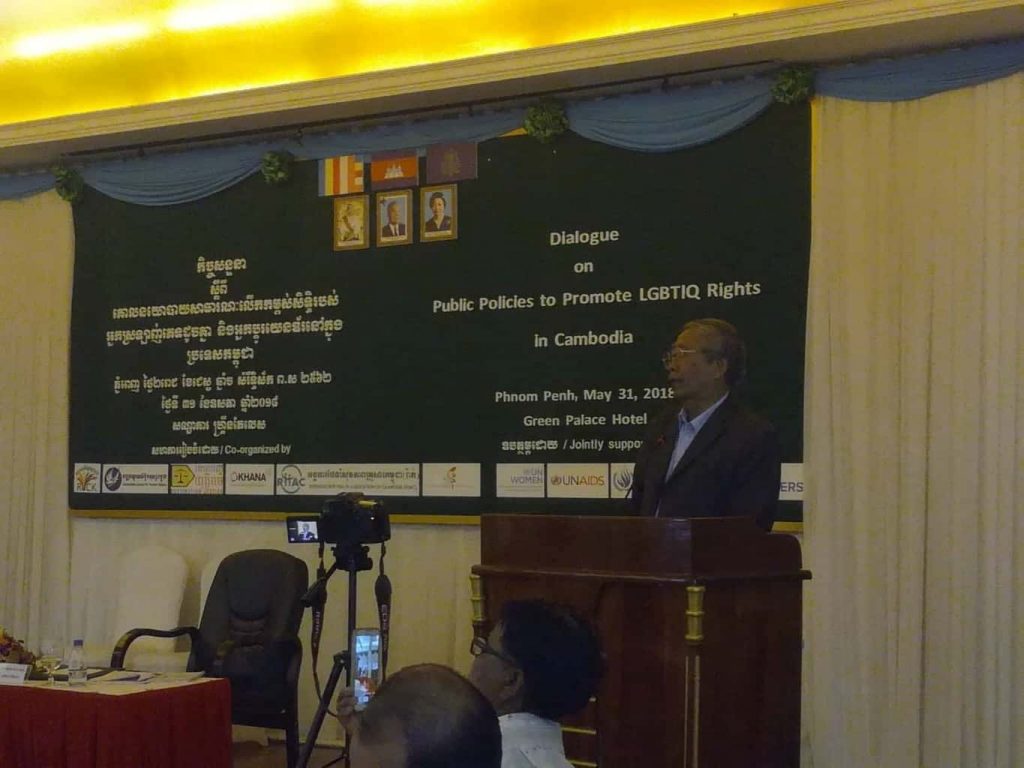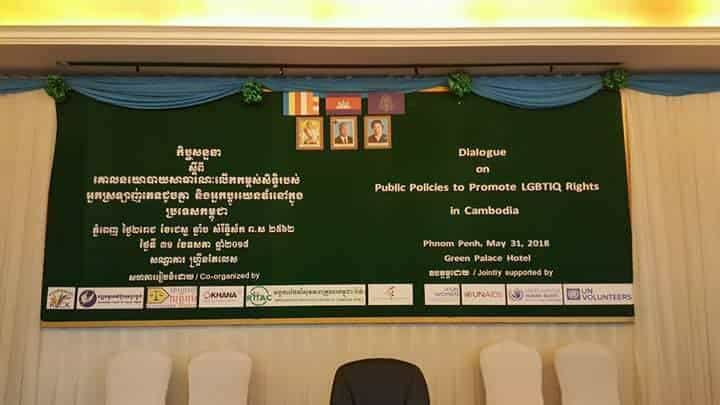LGBTI and gender inclusion issues in Cambodia
In Cambodia, many studies report that LGBTI persons have experienced various forms of discrimination and violence. These include family and community exclusion and denial of sexual orientation and gender expression, public violence due to gender expression, unemployment, lack of legal recognition and participation and limited access to health care and treatment.
Cambodia ratified the Convention on the Elimination of All Forms of Discrimination against Women (CEDAW) in 1992. CEDAW is one of the key international agreements that guides the work of the country in achieving gender equality and empowering all women and girls. Neary Rattanak IV is the five-year strategic plan (2014 – 2018) to continue the government’s efforts to promote gender equality and the empowerment of women in Cambodia. Building on the achievements of Cambodia Millennium Development Goals, the Royal Government of Cambodia has committed to implement the 2030 agenda with the vision of leaving no one behind. While goal 5 of the Sustainable Development Goal (SDG) aims for gender equality and women’s empowerment, gender has been cross cutting the priorities of the other 16 goals.
The high level dialogue on LGBTI rights
Referring to the above priorities and national commitment to advance gender equality and inclusiveness of service delivery in all sectors, a group of civil society organizations and LGBTI activists/advocates (RoCK, CCHR, KHANA, DJ, RHAC, and MRI), with the support of a group of UN agencies (UNWomen, UNAIDS, UNOHCHR and UNV) organised a public policies dialogue on 31st May 2018 at Green Palace Hotel, Phnom Penh City.
There were more than 60 participants including policy/decision makers such as representatives from the Ministry of Information, Ministry of Labour and Vocational Training, Ministry of Interior, and the Cambodian Human Rights Committee. These Ministries and the LGBTI community were able to discuss openly LGBTI’s concerns and priorities. They identified possibilities for inclusive policy as well as programme actions, with the objectives of tackling:
- Legal identity including equal marriage and ability to change to desired gender in official documents (national identity cards, passport, and family book)
- Discrimination and exclusion from family and school
- Employment opportunity and workplace discrimination
His Excellency Touch Phen, Secretary from Ministry of Information said:
LGBTI is a new issue and I will seriously take it into account to learn from the dialogue and share this learning further with the ministry for further support.
Her Excellency Jhean Sochetra, Vice Director Department of Social Welfare of Ministry of Women’s Affair added that LGBTI is not the new issue. LGBTI people existed a long time ago although we don’t talk about LGBTI. She asked the LGBTI community not to be upset for the late attention to the issues because social problems and attitudes can change and true acceptance is possible.
His Excellency Chum Mom, Vice Director Department Planning Statistic Employment and member of Gender Committee of Ministry of Labour and Vocational Training said that Constitutional law and Labour law does not discriminate LGBTI. He also added however that there isn’t any legislation to support LGBTI people to get decent work or to protect them from discrimination. If employers fire employees because they are LGBTI, it is the employers’ mistake. The Ministry of Labour and Vocational Training welcomes all genders and sexualities in the ministry. His Excellency Yen Malina, Vice Director Department Identity of Ministry of Interior echoed this view.
His Excellency Kata On, member of Cambodian Human Rights Committee added:
I encourage relevant stakeholders to continue to collaborate for legal solutions and policies for LGBTI people
Why is this dialogue important to MRI and next steps
MRI’s input in this dialogue was to raise awareness of the financial and economic exclusion that LGBTI people in Cambodia face. This event was important to MRI for three main reasons:
- policy officers heard about the high school drop-out levels of LGBTI people. MRI believes that if more LGBTI people are able gain qualifications they will increase their chances of survival and economic inclusion;
- policy makers also heard about the pressing need for new laws that can protect LGBTI people in the workplace and increase their employment opportunities. These are key lobbying areas for MRI. These laws would increase the chances for better LGBTI livelihoods and lives. They would also tackle some of the causes of LGBTI poverty;
- it was a rare opportunity to connect with high level policy makers and, together with other NGOs, to establish new relationships that can lead to more conversations and actions.
This dialogue was one of the biggest LGBTI events in terms of government representation. Several ministerial representatives have expressed support and the desire to continue the conversation. MRI is looking forward to continuing this engagement together with other civil society organisations and to seeing real policy changes being implemented soon.


